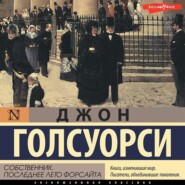По всем вопросам обращайтесь на: info@litportal.ru
(©) 2003-2024.
✖
The Forsyte Saga, Volume I. The Man Of Property
Настройки чтения
Размер шрифта
Высота строк
Поля
He pondered this as he walked steadily, holding his umbrella carefully by the wood, just below the crook of the handle, so as to keep the ferule off the ground, and not fray the silk in the middle. And, with his thin, high shoulders stooped, his long legs moving with swift mechanical precision, this passage through the Park, where the sun shone with a clear flame on so much idleness – on so many human evidences of the remorseless battle of Property, raging beyond its ring – was like the flight of some land bird across the sea.
He felt a touch on the arm as he came out at Albert Gate.
It was Soames, who, crossing from the shady side of Piccadilly, where he had been walking home from the office, had suddenly appeared alongside.
“Your mother’s in bed,” said James; “I was, just coming to you, but I suppose I shall be in the way.”
The outward relations between James and his son were marked by a lack of sentiment peculiarly Forsytean, but for all that the two were by no means unattached. Perhaps they regarded one another as an investment; certainly they were solicitous of each other’s welfare, glad of each other’s company. They had never exchanged two words upon the more intimate problems of life, or revealed in each other’s presence the existence of any deep feeling.
Something beyond the power of word-analysis bound them together, something hidden deep in the fibre of nations and families – for blood, they say, is thicker than water – and neither of them was a cold-blooded man. Indeed, in James love of his children was now the prime motive of his existence. To have creatures who were parts of himself, to whom he might transmit the money he saved, was at the root of his saving; and, at seventy-five, what was left that could give him pleasure, but – saving? The kernel of life was in this saving for his children.
Than James Forsyte, notwithstanding all his ‘Jonah-isms,’ there was no saner man (if the leading symptom of sanity, as we are told, is self-preservation, though without doubt Timothy went too far) in all this London, of which he owned so much, and loved with such a dumb love, as the centre of his opportunities. He had the marvellous instinctive sanity of the middle class. In him – more than in Jolyon, with his masterful will and his moments of tenderness and philosophy – more than in Swithin, the martyr to crankiness – Nicholas, the sufferer from ability – and Roger, the victim of enterprise – beat the true pulse of compromise; of all the brothers he was least remarkable in mind and person, and for that reason more likely to live for ever.
To James, more than to any of the others, was “the family” significant and dear. There had always been something primitive and cosy in his attitude towards life; he loved the family hearth, he loved gossip, and he loved grumbling. All his decisions were formed of a cream which he skimmed off the family mind; and, through that family, off the minds of thousands of other families of similar fibre. Year after year, week after week, he went to Timothy’s, and in his brother’s front drawing-room – his legs twisted, his long white whiskers framing his clean-shaven mouth – would sit watching the family pot simmer, the cream rising to the top; and he would go away sheltered, refreshed, comforted, with an indefinable sense of comfort.
Beneath the adamant of his self-preserving instinct there was much real softness in James; a visit to Timothy’s was like an hour spent in the lap of a mother; and the deep craving he himself had for the protection of the family wing reacted in turn on his feelings towards his own children; it was a nightmare to him to think of them exposed to the treatment of the world, in money, health, or reputation. When his old friend John Street’s son volunteered for special service, he shook his head querulously, and wondered what John Street was about to allow it; and when young Street was assagaied, he took it so much to heart that he made a point of calling everywhere with the special object of saying: He knew how it would be – he’d no patience with them!
When his son-in-law Dartie had that financial crisis, due to speculation in Oil Shares, James made himself ill worrying over it; the knell of all prosperity seemed to have sounded. It took him three months and a visit to Baden-Baden to get better; there was something terrible in the idea that but for his, James’s, money, Dartie’s name might have appeared in the Bankruptcy List.
Composed of a physiological mixture so sound that if he had an earache he thought he was dying, he regarded the occasional ailments of his wife and children as in the nature of personal grievances, special interventions of Providence for the purpose of destroying his peace of mind; but he did not believe at all in the ailments of people outside his own immediate family, affirming them in every case to be due to neglected liver.
His universal comment was: “What can they expect? I have it myself, if I’m not careful!”
When he went to Soames’s that evening he felt that life was hard on him: There was Emily with a bad toe, and Rachel gadding about in the country; he got no sympathy from anybody; and Ann, she was ill – he did not believe she would last through the summer; he had called there three times now without her being able to see him! And this idea of Soames’s, building a house, that would have to be looked into. As to the trouble with Irene, he didn’t know what was to come of that – anything might come of it!
He entered 62, Montpellier Square with the fullest intentions of being miserable. It was already half-past seven, and Irene, dressed for dinner, was seated in the drawing-room. She was wearing her gold-coloured frock – for, having been displayed at a dinner-party, a soiree, and a dance, it was now to be worn at home – and she had adorned the bosom with a cascade of lace, on which James’s eyes riveted themselves at once.
“Where do you get your things?” he said in an aggravated voice. “I never see Rachel and Cicely looking half so well. That rose-point, now – that’s not real!”
Irene came close, to prove to him that he was in error.
And, in spite of himself, James felt the influence of her deference, of the faint seductive perfume exhaling from her. No self-respecting Forsyte surrendered at a blow; so he merely said: He didn’t know – he expected she was spending a pretty penny on dress.
The gong sounded, and, putting her white arm within his, Irene took him into the dining-room. She seated him in Soames’s usual place, round the corner on her left. The light fell softly there, so that he would not be worried by the gradual dying of the day; and she began to talk to him about himself.
Presently, over James came a change, like the mellowing that steals upon a fruit in the sun; a sense of being caressed, and praised, and petted, and all without the bestowal of a single caress or word of praise. He felt that what he was eating was agreeing with him; he could not get that feeling at home; he did not know when he had enjoyed a glass of champagne so much, and, on inquiring the brand and price, was surprised to find that it was one of which he had a large stock himself, but could never drink; he instantly formed the resolution to let his wine merchant know that he had been swindled.
He felt a touch on the arm as he came out at Albert Gate.
It was Soames, who, crossing from the shady side of Piccadilly, where he had been walking home from the office, had suddenly appeared alongside.
“Your mother’s in bed,” said James; “I was, just coming to you, but I suppose I shall be in the way.”
The outward relations between James and his son were marked by a lack of sentiment peculiarly Forsytean, but for all that the two were by no means unattached. Perhaps they regarded one another as an investment; certainly they were solicitous of each other’s welfare, glad of each other’s company. They had never exchanged two words upon the more intimate problems of life, or revealed in each other’s presence the existence of any deep feeling.
Something beyond the power of word-analysis bound them together, something hidden deep in the fibre of nations and families – for blood, they say, is thicker than water – and neither of them was a cold-blooded man. Indeed, in James love of his children was now the prime motive of his existence. To have creatures who were parts of himself, to whom he might transmit the money he saved, was at the root of his saving; and, at seventy-five, what was left that could give him pleasure, but – saving? The kernel of life was in this saving for his children.
Than James Forsyte, notwithstanding all his ‘Jonah-isms,’ there was no saner man (if the leading symptom of sanity, as we are told, is self-preservation, though without doubt Timothy went too far) in all this London, of which he owned so much, and loved with such a dumb love, as the centre of his opportunities. He had the marvellous instinctive sanity of the middle class. In him – more than in Jolyon, with his masterful will and his moments of tenderness and philosophy – more than in Swithin, the martyr to crankiness – Nicholas, the sufferer from ability – and Roger, the victim of enterprise – beat the true pulse of compromise; of all the brothers he was least remarkable in mind and person, and for that reason more likely to live for ever.
To James, more than to any of the others, was “the family” significant and dear. There had always been something primitive and cosy in his attitude towards life; he loved the family hearth, he loved gossip, and he loved grumbling. All his decisions were formed of a cream which he skimmed off the family mind; and, through that family, off the minds of thousands of other families of similar fibre. Year after year, week after week, he went to Timothy’s, and in his brother’s front drawing-room – his legs twisted, his long white whiskers framing his clean-shaven mouth – would sit watching the family pot simmer, the cream rising to the top; and he would go away sheltered, refreshed, comforted, with an indefinable sense of comfort.
Beneath the adamant of his self-preserving instinct there was much real softness in James; a visit to Timothy’s was like an hour spent in the lap of a mother; and the deep craving he himself had for the protection of the family wing reacted in turn on his feelings towards his own children; it was a nightmare to him to think of them exposed to the treatment of the world, in money, health, or reputation. When his old friend John Street’s son volunteered for special service, he shook his head querulously, and wondered what John Street was about to allow it; and when young Street was assagaied, he took it so much to heart that he made a point of calling everywhere with the special object of saying: He knew how it would be – he’d no patience with them!
When his son-in-law Dartie had that financial crisis, due to speculation in Oil Shares, James made himself ill worrying over it; the knell of all prosperity seemed to have sounded. It took him three months and a visit to Baden-Baden to get better; there was something terrible in the idea that but for his, James’s, money, Dartie’s name might have appeared in the Bankruptcy List.
Composed of a physiological mixture so sound that if he had an earache he thought he was dying, he regarded the occasional ailments of his wife and children as in the nature of personal grievances, special interventions of Providence for the purpose of destroying his peace of mind; but he did not believe at all in the ailments of people outside his own immediate family, affirming them in every case to be due to neglected liver.
His universal comment was: “What can they expect? I have it myself, if I’m not careful!”
When he went to Soames’s that evening he felt that life was hard on him: There was Emily with a bad toe, and Rachel gadding about in the country; he got no sympathy from anybody; and Ann, she was ill – he did not believe she would last through the summer; he had called there three times now without her being able to see him! And this idea of Soames’s, building a house, that would have to be looked into. As to the trouble with Irene, he didn’t know what was to come of that – anything might come of it!
He entered 62, Montpellier Square with the fullest intentions of being miserable. It was already half-past seven, and Irene, dressed for dinner, was seated in the drawing-room. She was wearing her gold-coloured frock – for, having been displayed at a dinner-party, a soiree, and a dance, it was now to be worn at home – and she had adorned the bosom with a cascade of lace, on which James’s eyes riveted themselves at once.
“Where do you get your things?” he said in an aggravated voice. “I never see Rachel and Cicely looking half so well. That rose-point, now – that’s not real!”
Irene came close, to prove to him that he was in error.
And, in spite of himself, James felt the influence of her deference, of the faint seductive perfume exhaling from her. No self-respecting Forsyte surrendered at a blow; so he merely said: He didn’t know – he expected she was spending a pretty penny on dress.
The gong sounded, and, putting her white arm within his, Irene took him into the dining-room. She seated him in Soames’s usual place, round the corner on her left. The light fell softly there, so that he would not be worried by the gradual dying of the day; and she began to talk to him about himself.
Presently, over James came a change, like the mellowing that steals upon a fruit in the sun; a sense of being caressed, and praised, and petted, and all without the bestowal of a single caress or word of praise. He felt that what he was eating was agreeing with him; he could not get that feeling at home; he did not know when he had enjoyed a glass of champagne so much, and, on inquiring the brand and price, was surprised to find that it was one of which he had a large stock himself, but could never drink; he instantly formed the resolution to let his wine merchant know that he had been swindled.

















